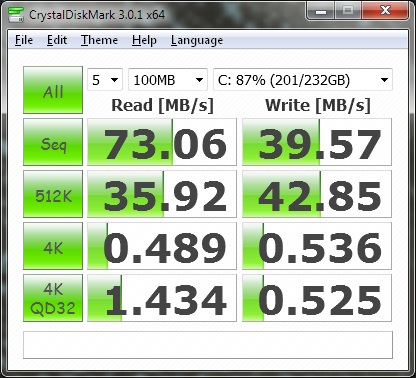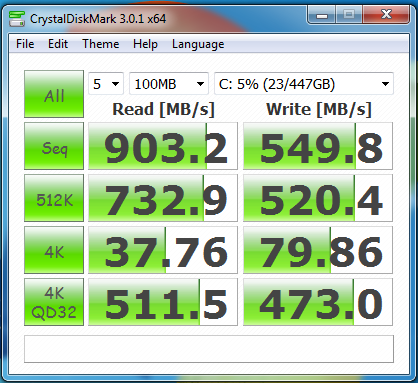Hello,
Here's my work PC's HDD read/write:

Out of curiosity, I decided to compare it to my new laptop that I bought with a $2,000 CAD budget in mind:

Here are the differences (in x times)
PC specs:
Dell T1500 Workstation
Intel i3 530 @ 2.93GHz (Clarkdale)
8 GB (4x2 GB) DDR3 @ 1333MHz CL9
Seagate Barracuda 250 GB 7200 RPM 8MB SATA 3.0GB/s
Windows 7 Professional
Laptop specs:
MSI GT683
Intel i7 2670QM @ 2.2 to 3.1 GHz (Max Turbo Boost)
32 GB (4x8 GB) DDR3 @ 1600 MHz CL10
2x Intel 520 240 GB RAID-0
Windows 7 Ultimate
I'm running a MySQL server on my work PC. The database has with three MyISAM tables: 4.40 GB, 438 MB, and 69.7 MB. When I dump the database to .sql, its total size is 9 GB. I'm going to setup the same database on my laptop and do some tests on it. The queries that I'm going to run are SELECT, JOIN, and GROUP BY, usually on indexes.
Here's my question: do how much faster do you think it will run on my laptop if I do the same exact queries?
Thanks!
Here's my work PC's HDD read/write:

Out of curiosity, I decided to compare it to my new laptop that I bought with a $2,000 CAD budget in mind:

Here are the differences (in x times)
Code:
Test Read Write
Seq 11.36 12.89
512K Random 19.40 11.15
4K Random 76.22 147.99
4K QD32 Random 355.69 899.95Dell T1500 Workstation
Intel i3 530 @ 2.93GHz (Clarkdale)
8 GB (4x2 GB) DDR3 @ 1333MHz CL9
Seagate Barracuda 250 GB 7200 RPM 8MB SATA 3.0GB/s
Windows 7 Professional
Laptop specs:
MSI GT683
Intel i7 2670QM @ 2.2 to 3.1 GHz (Max Turbo Boost)
32 GB (4x8 GB) DDR3 @ 1600 MHz CL10
2x Intel 520 240 GB RAID-0
Windows 7 Ultimate
I'm running a MySQL server on my work PC. The database has with three MyISAM tables: 4.40 GB, 438 MB, and 69.7 MB. When I dump the database to .sql, its total size is 9 GB. I'm going to setup the same database on my laptop and do some tests on it. The queries that I'm going to run are SELECT, JOIN, and GROUP BY, usually on indexes.
Here's my question: do how much faster do you think it will run on my laptop if I do the same exact queries?
Thanks!
![[H]ard|Forum](/styles/hardforum/xenforo/logo_dark.png)